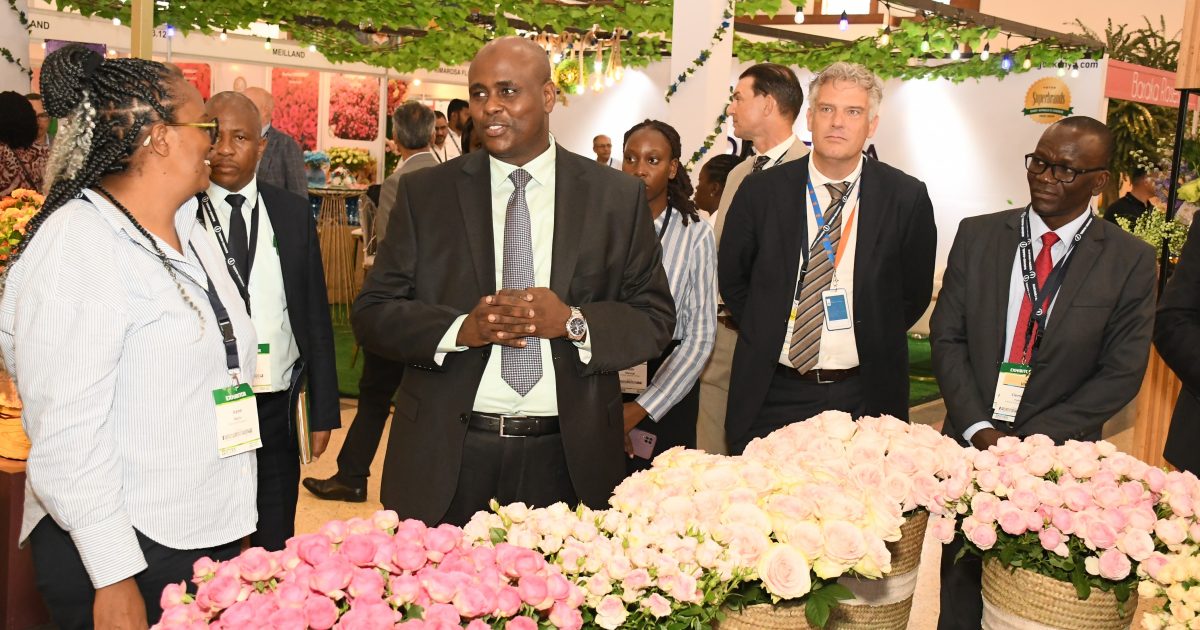The government is in the process of enacting the Carbon Credit Trading and Benefit Sharing Bill of 2023.
This proposed legislation aims to create a robust regulatory framework for carbon credit trading and benefit-sharing.
It will also establish an Authority to oversee legislative measures that significantly benefit the floriculture sector providing for the registration and regulation of carbon trading businesses, and setting up a Carbon Credit Trading Tribunal to address disputes.
Speaking today when opening the 11th International Floriculture Trade Expo (IFTEX) at the Oshwal Centre, State Department for Cabinet Affairs Principal Secretary Dr Idris Salim Dokota said that the amended Climate Act now establishes a national carbon registry in Kenya and regulates the trade in carbon credits.
“This framework will ensure transparency and accountability in our carbon trading endeavours and with this, our flower farms can also generate additional revenue by engaging in carbon credit projects,” he added
He explained that Kenya’s flower farms can generate additional revenue by engaging in carbon credit projects and by adopting sustainable practices and reducing their carbon footprint, they can earn carbon credits that can be traded internationally.
Representatives from 75 countries are participating in the week-long 11th International Floriculture Expo that has begun today guided by the theme “Sustainability”.
“The theme of this year’s Expo is Sustainability resonates deeply with the government’s commitment to nurturing Kenya’s floriculture,” the PS said.
“Sustainability is not just a buzzword; it is our shared responsibility. We protect both our industry and our environment,” Dr Dakota added, noting that the government is actively promoting eco-friendly practices such as integrated pest management, water conservation, and organic fertilisation as well as encouraging farmers to adopt renewable energy sources and minimise their carbon footprint.
He said that Kenya’s floriculture sector has propelled the country to become a global leader in floriculture, contributing significantly to the economy, creating jobs, and enhancing the livelihoods of over 2 million Kenyans.
The PS noted that the government has implemented policies that facilitate a conducive business environment, has streamlined export processes, created investment opportunities, and offered support for small and medium-sized enterprises within the floriculture value chain.
“By reducing bureaucratic hurdles and promoting fair trade practices, the government as one of the key priorities outlined in the Bottom-Up Economic Transformation Agenda (BETA) aim to enhance the competitiveness of our flowers in the global market,” he said
Dr Dakota added that the government has also invested in modernising transportation networks, including roads, railways, and airports to enhance efficient logistics that are essential for successful floriculture exports.
“This infrastructure has facilitated the seamless movement of flowers from our farms to international markets, preserving their freshness and quality,” he noted, adding that the government has also negotiated favourable trade agreements with various countries, opening doors for Kenyan floriculture exports.
The agreements, he explained, have eliminated trade barriers, promoted fair pricing, and created a level playing field for our flowers in the global market.
Dr Dakota gave an example of the Kenya-EU Economic Partnership Agreement, signed in December last year 2023 which has now been ratified by both the National Assembly of Kenya and the European Union in Brussels.
Additionally, he added that collaboration with the UK has resulted in the suspension of the 8 percent duty on cut flowers from Kenya, further demonstrating the successful partnerships.
Christopher Kulei, Chair, Board of Directors, Kenya Flower Council (KFC) said that with around 5,000 hectares dedicated to flower cultivation, the industry exports over 200,000 tonnes of flowers annually, valued at USD900 million, bringing in vital forex revenues to the economy.
The floriculture sector, he explained, accounts for more than 70 percent of total horticultural exports, employing over 200,000 workers, most of them in rural areas.
Additionally, he added that it indirectly provides employment to 1 million people involved in the supply of goods and services and affects over 4 million people.
Kulei however said that the government however needs to create a conducive business environment by streamlining its processes, reviewing its regulations, and providing incentives for growers and exporters.
“If we have to unlock the full potential of the floriculture industry, more investment will mean more jobs, more forex income and solidifying Kenya’s position in the global flower trade,” he added.
He re-affirmed KFC’s dedication to sustainable floriculture saying they have invested significantly in reducing and recycling water usage, implementing biological pest management systems, utilising solar energy, and adopting greener logistics to reduce greenhouse gas emissions.
“We have embraced various carbon measurement tools, which have enabled us to accurately assess our emissions and identify areas for improvement,” Kulei said.
He noted that Sustainability has evolved from an exterior concern and considering the effects of calamities of the recent floods that has seen loss of hundreds of lives, saying that it is imperative and important for sustainable business practices in curbing the effects of climate change.
This year’s expo has seen an increase of 20 percent in exhibitors showcasing their finest blooms and will also provide a unique platform for sharing knowledge, forging partnerships, and exploring new opportunities.
According to the Horticultural Crops Directorate (HCD) data, cut flower exports fetched Sh73. 45 billion in 2023, marking a steep decline from Sh104. 25 billion in 2022.
The decline was informed by a significant drop in export volumes, which went down to 116,270 tonnes from 202,850 tonnes that were exported in 2022.
By Wangari Ndirangu




